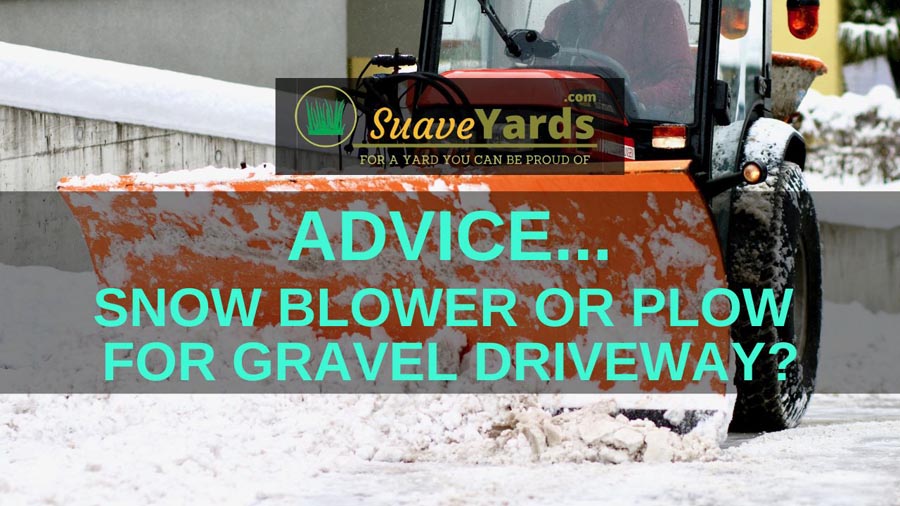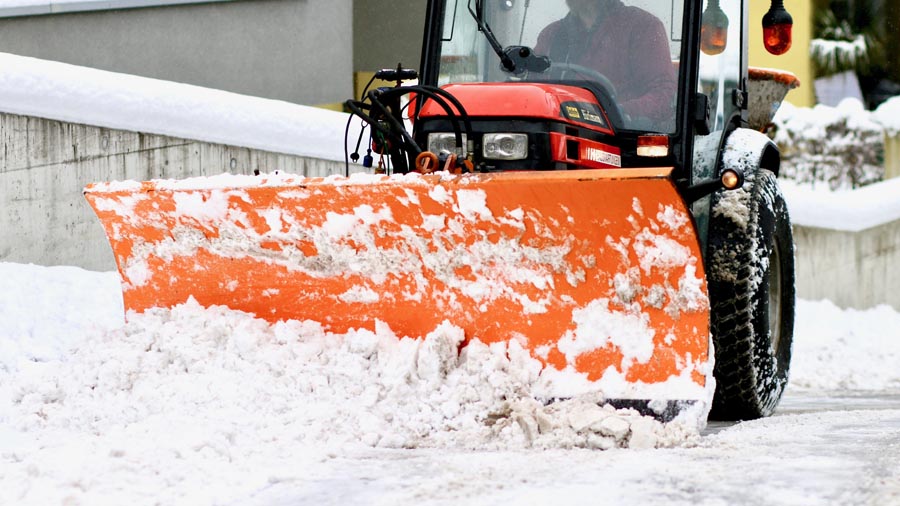
Do I need a snow blower or plow for my gravel driveway is a question that gets asked a lot.
That is because you want to remove the snow, but you don’t want to remove the gravel.
The truth is there is no straightforward answer as it is likely either of them could do a good job.
On top of that the size and type of gravel driveway you have and the amount of snow you usually get are both important factors to consider.
So in this article we will look at the pros and cons of both so you can decide which is the best choice for your gravel driveway.
Let’s dive in!
Snow Blower Or Plow For Gravel Driveway?
This very much depends upon your driveway and the weather conditions in the area you live in. Snow blowers are better at dealing with deep, heavy snow and if you have limited space to pile snow up in. Snow plows will make much quicker work of lighter snow and large flat areas where there is plenty of space to push the snow as it piles up
Snow Blowers: The Case For
When it comes to moving deep snow, then snow blowers, especially two-stage blowers, are the outright winner.
A snow blower will move deeper snow and throw it further out of the way than a snow plow could.
If snow is deep (lets say 5 inches or above), or wet and heavy then a plow can be overwhelmed by the weight of it and won’t do as good a job.
Once deep snow begins to pile up in front of a plow it will quickly bog down.
With a blower there are no concerns about where you push the snow, it will just throw it 20 or so feet over the last snow pile
If you are using a blower, just remember to set the skids so they have between ½ inch and an inch of clearance to keep it from picking up the gravel and slinging it across the yard.
Snow blowers are also a better bet when ice builds up, they have better traction and you will have better control of the unit than you would using a snow plow in icy conditions.
For similar reasons, a snow blower works better if you have a gravel driveway that slopes and you need to clear snow as you move uphill.
You just have to drive far enough for it to build up and roll into the blower.
In Short:
- Better for deep snow.
- Better if you have limited space to push snow.
- Better in icy conditions.
- Better on undulating driveways.
Snow Blowers: The Case Against

The most obvious thing you need to be careful of if you use a snow blower to clear snow from a gravel driveway is the direction in which you throw the snow.
Make sure you keep the discharge chute directed away from any glass because no matter how hard you try there is going to be a chance of picking up a stray stone and shooting it out of the snow blower and damaging a window or your car.
As I mentioned above, to reduce the likelihood of this happening you need to set the skids to have up to an inch of clearance from the gravel.
That means with a blower you will have up to an inch of snow left on your gravel driveway.
Snow blowers are more complex pieces of machinery and are more likely to not start or have mechanical problems than snow plows.
Even if you buy a really robust, two-stage metal snow blower, you can have issues with gravel getting in the chain and kicking it off or gravel jamming the auger and breaking shear pins.
If you have a plastic snow blower, then its lifespan will be even shorter on the gravel.
In Short:
- The danger of gravel breaking windows/damaging cars.
- Will leave an ½ inch to an inch of snow on the driveway.
- More likely to have mechanical problems or not start.
RELATED ===> Buyers Guide: The Best Snow Blowers on the Market
Snow Plows: The Case For
For larger flat driveways with plenty of room to push snow, then a plow will be quicker and easier.
For lighter snow or snow that is not very deep, a plow also wins out and will do the job better.
Another benefit of a plow is that, unlike a blower, whilst using it, it will smooth out the drive.
Snow plows also tend to be able to clear slushy snow more easily, something that blowers often are not as adept at.
One major advantage a snow plow has is the cab offers a lot of protection when the snow is blowing.
With a blower, in windy conditions, there will be times when you will get snow blown back into your face, whereas when you are sat in the cab of a snow plow you never have that problem.
Then of course the blades of a snow plow have other uses. The rear blade can get much closer to the ground to scrape snow away and can also be used to move gravel in the summer for instance.
In Short:
- Better for large, flat gravel driveways.
- Better for lighter snow.
- Will also smooth out the driveway.
- Deals with slushy snow better.
- The cab offers protection against snow being blown back at you.
- The plow has other uses.
Snow Plows: The Case Against

RELATED ===> What is the Ideal Snow Blower Height For A Gravel Driveway?
The problem with a snow plow is you need somewhere to push the snow you are plowing.
If there isn’t space to push it past the edge of your driveway it will just keep piling up and your driveway will become narrower and narrower with every snowfall.
As mentioned above, when snow is heavy and deep the blades of a plow will be overwhelmed by the weight. You will have to tackle the job in smaller bites and it will take longer.
A snow plow will also work better going downhill compared to going uphill as they lack the weight and momentum you need in these circumstances.
In the same way, plows struggle on icy surfaces, often not having the weight to stablize them.
In Short:
- You need somewhere for the snow to be pushed.
- Won’t deal with heavy and deep snow as well.
- Not as going on uphill slopes.
- Struggle on icy surfaces.
In Summary
The honest truth is both snow blowers and snow plows will work on gravel, and both will move some gravel from your drive to your yard that you will need to rake up come spring time.
In an ideal world, it would be handy to have both, but I know that isn’t always financially viable.
So…
If you live somewhere that doesn’t get regular, heavy snowfall and have a place to move the snow, then a snow plow will be your best bet if you have a gravel driveway.
If you live somewhere that gets a lot of snow, and it accumulates or you don’t have anywhere to push the snow then a snow blower will be a better option for you, ideally a two-stage snow blower.
How To Use A Snowblower On A Gravel Driveway
The problem with using a snow blower on a gravel driveway occurs when the rotating blades come into contact with the gravel.
Single-stage blowers rarely have skid pads, so if you are using a single-stage blower, you need to make sure the discharge chute is not facing anything that could be damaged by stray gravel.
If you have two-stage or three-stage snow blower set the skids so you have around ½ inch to an inch of clearance.
Ideally start at an inch and see how that works out for you and you can always take it down slightly again the next time you use your snow blower.
If the wind is blowing start on the most upwind section of your driveway and set the chute so it discharges snow downwind.
If you come to some snow that is particularly deep, then you will want to remove it in two passes.
When you are finished, make sure you clean out the auger before you store your snow blower.
If you don’t the snow could freeze solid, and cause damage to your snow blower when you next go to use it.
Or you can just watch the video above!
RELATED ===> Steel Vs Rubber Snow Blower Auger: Which Is The Best Choice?
Snowblower Modifications for Gravel Driveways
When I was researching this article I found a number of people who had made some pretty nifty modifications to their snow blowers or snow plows to help them clear snow from their gravel driveways.
Now before I go any further I need to put the disclaimer out there that any modifications you do make to your snow blower or snow plow are done at your own risk.
Not only that, it will most probably void the warranty of the machine.
Still interested? Ok here are some ideas.
Modification #1
Tape some PVC over the cutting edge of your snow blower, and adjust the skids so they touch the ground with the PVC.
- Full Details: MyTractorForum
Modification #2
Remove the skid shoes on the back of the blower and weld a 3/16” plate on in their place and attach the wheels to this.
- Full Details: MyTractorForum
Modification #3
Install 8” caster wheels to provide extra stability and clearance for gravel driveways.
- Full Details: MyTractorForum
What is the Best Snow Blower For a Gravel Driveway?
You will find much more extensive articles than mine giving you roundups of the best snow blowers for gravel driveways.
However, first things first, get a two-stage front mount blower. Make sure it is built well and not out of plastic.
Blowers with electric starters that plug into the wall outlets are good, as it makes it so much easier to get them going. This can be especially useful if it is their first outing for 8 or 9 months!
Unlike single-stage blowers, you can adjust the height of the auger in two-stage or three-stage blowers.
This means, when it comes to gravel driveways, you can set two or three stage blowers so they don’t make contact with the ground and throw gravel everywhere.
Three good snow blowers to consider:
- Honda Power Equipment HSS928AATD Two-Stage Blower
- Husqvarna ST224 Two-Stage Blower
- Ariens 921045 Two-Stage Blower
Final Thoughts

So snow blower or plow for a gravel driveway? As you can see from the infographic above the answer is, it depends!
Snow plows are best if you have space to move the snow, and if you live in an area that doesn’t get heavy snowfall.
Snow blowers are better at dealing with heavy snowfall, and should also be your choice if you don’t have the space on your driveway to pile snow up.
Both have their plusses and minuses and inevitably with both, no matter how hard you try, you will end up transporting some gravel from your driveway into the yard that you will need to rake up later in the year.
If you can afford to buy both then that is what I would suggest, but if not pick the one that suits your situation the best.
Good luck!
